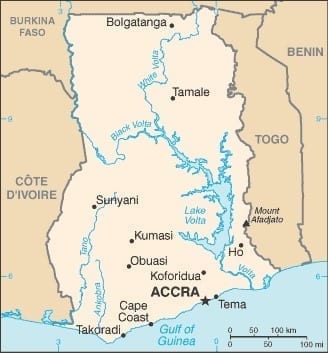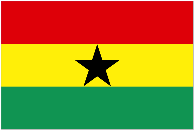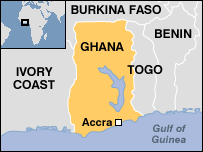Official Name: Republic of Ghana
Time Zone: GMT (Greenwich Mean Time)
Internet Domain: .gh
International Dialing Code: +233
| Location and Size | Comparative Economic Indicators |
| Government | Credit and Collections |
| Legal System | Risk Assessment |
| People | Business Climate |
| Economy | Business Protocol |
Location and Size
Located on West Africa’s Gulf of Guinea only a few degrees north of the Equator. About the size of the U.S. states of Illinois and Indiana combined.
Government
Constitutional democracy; 10 regions, 3 branches:
- Executive: President and head of government President John Agyekum Kufuor; Council of State, a presidential appointed consultative body of 25 members.
- Legislative: Unicameral 230-member Parliament popularly elected for 4-year terms.
- Judicial: Independent Supreme Court justices nominated by president with approval of Parliament.
Legal System
Based on British common law and customary law; has not accepted compulsory International Court of Justice jurisdiction.
People
- Population (2019): 28,102,471
- Population growth rate (2019): 2.16%
- Languages: Official language is English; more than 50 other languages and dialects spoken
- Literacy: 76.6%
Economy
After a decade of structural adjustment reforms, Ghana has established a significant record of economic growth, expanding export industries, a growing stock market and rapidly increasing private investment opportunities. Well endowed with natural resources, Ghana has roughly twice the per capita output of the poorest countries in West Africa. Even so, Ghana remains heavily dependent on international financial and technical assistance. Gold and cocoa production, and individual remittances, are major sources of foreign exchange. The domestic economy continues to revolve around agriculture, which accounts for about 35% of GDP and employs about 55% of the work force, mainly small landholders.
Ghana’s stated goals are to accelerate economic growth, improve the quality of life for all Ghanaians, and reduce poverty through macroeconomic stability, higher private investment, broad-based social and rural development, as well as direct poverty-alleviation efforts. Key economic challenges include: overcoming infrastructure bottlenecks, especially in energy and water; poor management of natural resources; improving human resource capacity and development; establishing a business and investment climate that encourages and allows private sector-led growth, and privatizing remaining state-owned enterprises, several of which are significant budget liabilities.
Currency: Cedi (GHC)
Leading Markets (2019): India 23.8%, UAE 13.4%, China 10.8%, Switzerland 10.1%, Vietnam 5.2%, Burkina Faso 4%
Leading Exports – Commodities: Gold, cocoa, timber, tuna, bauxite, aluminum, manganese ore, diamonds, horticultural products
Leading Suppliers (2019): China 16.8%, US 8%, UK 6.2%, Belgium 5.9%, India 4.1%
Leading Imports – Commodities: Capital equipment, petroleum, foodstuffs
Top Industries: Mining, lumbering, light manufacturing, aluminum smelting, food processing, cement, small commercial ship building, petroleum
Top Agricultural Products: Cocoa, rice, cassava (tapioca), peanuts, corn, shea nuts, bananas; timber
Comparative Economic Indicators – 2019
| Ghana | Cote d’Ivoire | Benin | Nigeria | Senegal | Burkina- Faso |
|
| Population (millions) | 28.1 | 26.2 | 11.3 | 203.4 | 15.0 | 19.7 |
| Population growth (%) | 2.16 | 2.3 | 2.68 | 2.54 | 2.36 | 2.76 |
| GDP (USD billions) PPP | 134.0 | 97.2 | 25.4 | 1,112.0 | 54.8 | 35.8 |
| GDP per capita (USD) PPP | 4,700 | 3,900 | 2,300 | 5,900 | 3,500 | 1,900 |
| GDP growth: (%) | 8.4 | 7.8 | 5.6 | 0.8 | 7.2 | 6.4 |
| Inflation (%) | 12.4 | 0.8 | 0.1 | 16.5 | 1.3 | 0.4 |
| Unemployment rate (%)* | 11.9 | 9.4 | 1.0 | 16.5 | 48.0 | 77.0 |
| Exports (USD billions) | 13.84 | 11.74 | 1.97 | 52.9 | 3.59 | 2.27 |
| Imports (USD billions) | 12.65 | 9.45 | 2.78 | 32.67 | 7,89 | 2.27 |
| Foreign debt (% of GDP) | 48.12 | 34.41 | 31.28 | 11.05 | 56.22 | 25.01 |
| Currency | Cedi (GHS) |
West African Franc (CFA) |
West African Franc (CFA) |
Naira (NGN) |
West African Franc (CFA) |
West African Franc (CFA) |
|
Exchange rates (per USD)
on 11/22/19
|
5.51 | 598.53 | 598.53 | 361.00 | 598.53 | 598.53 |
|
Exchange rates (per EUR)
on 11/22/19
|
6.07 | 655.90 | 655.90 | 397.44 | 655.90 | 655.90 |
Credit and Collections
- Collection Experience: Fair-Poor
- Exchange Delays: 3 months
- Preferred Credit Terms: Unconfirmed letter of credit
- Minimum Credit Terms: Unconfirmed letter of credit
Dispute Resolution (information from the U.S. Department of State)
The courts are slow in disposing of cases and face challenges in enforcing decisions, due to resource constraints and institutional inefficiencies. There is a growing interest in alternative dispute resolution, especially as it applies to commercial cases. Arbitration decisions are enforceable provided they are registered in the courts.
Enforcement of foreign judgments in Ghana is based on the doctrine of reciprocity. On this basis, judgments from Brazil, France, Israel, Italy, Japan, Lebanon, Senegal, Spain, the United Arab Emirates, and the United Kingdom are enforceable. Judgments from the United States are not currently enforceable in Ghana.
Risk Assessment
Coface Country Risk Rating: B – Robust growth, despite constraints on the banking sector
Credendo Political Risk Rating: 4 – Slightly higher than moderate risk
Credendo Commercial Risk Rating: C ” High risk
Business Climate
Ghana emerged from British rule in 1957, becoming sub-Saharan Africa’s first European colony to achieve independence. Since then Ghana has remained a relatively peaceful country in a region plagued by conflict and instability. A well-administered country by regional standards, Ghana is often seen as a model for political and economic reform in Africa.
Transparency of Regulatory System: The Government of Ghana has shown great commitment to attracting foreign investments by improving the regulatory environment. Still, commercial regulations are extensive, and labor market laws are especially inflexible. Administrative procedures related to obtaining various licenses and permits are time-consuming and costly although comparable to the regional average.
According to Transparency International’s 2018 Corruption Perceptions Index (CPI), Ghana ranks 78th out of 180 countries in terms of perceived corruption and 8th in Africa. Ghana’s CPI score of 41 indicates that corruption is of some concern.
Protection of Intellectual Property: Protection of intellectual property is an evolving area of law in Ghana. In recent years, progress has been made to afford protection under both local and international law. Ghana is a party to the Universal Copyright Convention and a member of the World Intellectual Property Organization (WIPO), the English-speaking African Regional Industrial Property Organization (ESARIPO), and the World Trade Organization (WTO). Piracy is known to take place, but there is no reliable information on the scale of this activity. Holders of intellectual property rights have access to local courts for redress of grievances, although few trademark, patent, and copyright infringement cases have been filed in Ghana.
Conversion and Transfer Policies: Ghana operates a free-floating exchange rate policy regime. There are no restrictions on conversion and transfer of funds provided there is documentation proving how the funds were acquired. Ghana’s local currency, the cedi, can be exchanged for dollars and major European currencies.
Corruption: Ghana is considered to be one of the more stable countries in West Africa, since its transition to multi-party democracy in 1992. Corruption exists in all branches of Ghanaian government, and there is often a lack of accountability. The culprits often enjoy impunity. The judiciary and police are viewed as the most corrupt. However, the creation of the Office of the Special Prosecutor has instilled new hope in Ghana’s anti-corruption efforts. Its score of 41 out of 100 on the 2018 Corruptions Perceptions Index from Transparency International positions it below the world average for levels of corruption.
Political Violence: Ghana offers a relatively stable and predictable political environment for investors. Ghana has a solid democratic tradition, completing its seventh consecutive democratic election in 2016. There is no indication at present that the level of political risk in Ghana will change markedly over the near term.
Economic Freedom: According to the 2019 Index of Economic Freedom, Ghana is 57.5% free, making it the worlds 109th freest economy in the world and 11th freest of the 25 countries making up the sub-Saharan Africa region. Ghana scores relatively well in fiscal freedom, government size, and property rights. Ghana could make significant progress in areas such as investment freedom, financial freedom, labor freedom, and freedom from corruption.
For more detailed information on these topics, visit the U.S. Department of State’s 2019 Investment Climate Statement ” Ghana, and GAN’s Business Anti-Corruption Portal Ghana Country Report.
Business Customs and Protocol
Greeting: Handshaking using the right hand is the usual form of greeting.
Business Cards: It is customary to exchange business cards. As English is the official language, it is appropriate to have your business card only in English.
Business Attire: Business meetings with members of the government, civil service, banks or heads of large organizations or international bodies are fairly formal and it is recommended that men wear business suits. Lightweight suits are suitable for other business, social or ceremonial occasions which are generally less formal. Because of the climate lightweight suits are best. Cotton dresses are suitable for women. Generally, slacks are considered inappropriate for women.
Gifts: Use only the right hand for giving or accepting gifts as use of the left hand is considered offensive.
Meetings and Negotiations: Appointments are customary and visitors are expected to be punctual. Ghanaian businesspersons, however, may not always be on time for meetings, with poor communications and transportation infrastructures compounding the difficulties.
Acceptable Public Conduct: Do not blow your nose while eating. Never sniff any food or beverage offered you. It is considered rude to point, or to summon a person with the palm up. Wearing of any military apparel, such as camouflage jackets or trousers, or any clothing or items, which may appear military in nature, is strictly prohibited.
Sources for further information on doing business in Ghana
Market Overview in Ghana:, Export.gov, 2018
Doing Business 2019: Ghana World Bank Group Flagship Report (PDF)
Embassy of Ghana, Washington, DC
U.S. Diplomatic Mission to Ghana
[Table of Contents]
**********
Subscribe to the Credit-to-Cash Advisor
Monthly e-Newsletter — It’s Free
This information is provided by ABC-Amega Inc. Providing international receivable management and debt collection services for exporters to more than 200 countries including Ghana.
For further information, contact [email protected].
Historical Exchange Rates: OANDA.com The Currency Site.


